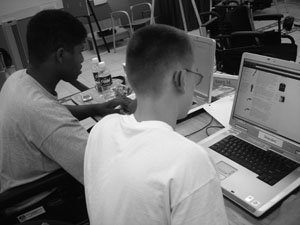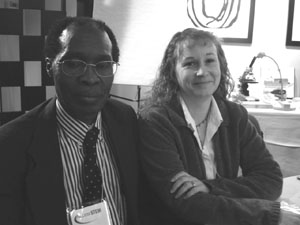About the CBI

The AccessSTEM Capacity-Building Institute (CBI) took place January 10 - 12, 2007, in Seattle. Its overall purpose was to explore ways to increase the participation of people with disabilities in all STEM projects and, ultimately, in careers.
Participants in this two-and-one-half day event included leaders of NSF projects that promote the participation of women, racial/ethnic minorities, and people with disabilities in science, technology, engineering, and mathematics. Hosted by the University of Washington, the AccessSTEM CBI provided a forum for comparing recruitment and access challenges, sharing successful practices, developing collaborations, and otherwise increasing the capacity of all NSF-funded projects to serve individuals with disabilities. The ultimate goal of the 2007 AccessSTEM CBI was to increase the participation of individuals with disabilities, particularly those who are also members of other underrepresented groups, in STEM fields. Speakers and panelists were also CBI participants; many have disabilities and/or are women or racial/ethnic minorities. Broad issue areas discussed included:
- K-12 education
- recruitment/transition to higher education
- retention in higher education
- graduate school enrollment and retention
- employment
In this CBI:
- Experts in all topic areas were in the audience and others "visited" the CBI via video.
- All participants were actively engaged.
- Participants didn't just present predetermined professional development; participants requested and offered content as the meeting evolved.
- "Handouts" were online.
- Participants explored ways to "build capacity" to reach the goal of the Institute, within their projects or organizations and beyond.
Participants discussed barriers encountered by individuals with disabilities (e.g., access to science labs, field trips, technology, information resources), how to eliminate or reduce these barriers, successful strategies for recruiting and retaining individuals with disabilities into STEM fields, how projects that support other underrepresented groups can work with projects that support individuals with disabilities to maximize outcomes, and how all STEM programs can be made more inclusive of individuals with disabilities by applying universal design principles. Successful strategies discussed extend from K-12 through college and employment within two categories:
- the delivery of direct services to students with disabilities
- the creation of more accessible learning and work environments to assure long-term impact

Four specific questions were addressed by CBI participants:
- How are STEM access issues for people with disabilities the same as those for other underrepresented groups (e.g., racial/ethnic minorities, women)? How are they different?
- In what ways do making STEM activities accessible to students with disabilities benefit other students?
- What can STEM projects do to increase the participation of students with disabilities?
- How can projects best measure the outcomes and impacts of their interventions to increase the participation of underrepresented minorities, women, and people with disabilities in STEM?
Presentations and panels at the CBI were followed by small group interactions regarding the topics presented. Group representatives reported to all participants and notes were incorporated into the proceedings. In addition to CBI participants, and other NSF project directors, the results of these efforts are shared through the AccessSTEM Knowledge Base.